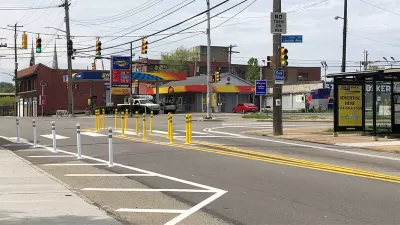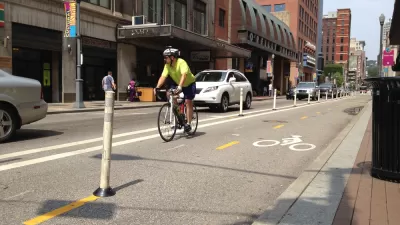With a planned pace of ten new miles of bike lanes every year for the next five years, Pittsburgh is already making over many of its thoroughfares in the complete streets model. A formal city policy certainly won't hurt, however.

Ed Blazina reports on the first public meeting of the planning process for the city of Pittsburgh's Complete Streets policy. The response from the public, so far, has been strong: "More than 150 people attended the initial meeting at the University of Pittsburgh's Alumni Hall Tuesday night, interested to learn the types of steps the city may consider to improve street safety for motorists, pedestrians, bicyclists and transit users."
According to Blazina, "[t]he city is working with the National Complete Streets Coalition to develop a policy over the next 18 months and presented an overview of the project." Pittsburgh Planning Director Ray Gastil was on hand to explain to the audience that Complete Streets are a concept that has already been applied in some 800 communities large and small.
The article offers more insight into the talking points selected by planners introducing the idea of Complete Streets to a new, but eager, audience.
FULL STORY: Pittsburgh Complete Streets planners emphasize change at initial public meeting

Planetizen Federal Action Tracker
A weekly monitor of how Trump’s orders and actions are impacting planners and planning in America.

Restaurant Patios Were a Pandemic Win — Why Were They so Hard to Keep?
Social distancing requirements and changes in travel patterns prompted cities to pilot new uses for street and sidewalk space. Then it got complicated.

Map: Where Senate Republicans Want to Sell Your Public Lands
For public land advocates, the Senate Republicans’ proposal to sell millions of acres of public land in the West is “the biggest fight of their careers.”

Maui's Vacation Rental Debate Turns Ugly
Verbal attacks, misinformation campaigns and fistfights plague a high-stakes debate to convert thousands of vacation rentals into long-term housing.

San Francisco Suspends Traffic Calming Amidst Record Deaths
Citing “a challenging fiscal landscape,” the city will cease the program on the heels of 42 traffic deaths, including 24 pedestrians.

California Homeless Arrests, Citations Spike After Ruling
An investigation reveals that anti-homeless actions increased up to 500% after Grants Pass v. Johnson — even in cities claiming no policy change.
Urban Design for Planners 1: Software Tools
This six-course series explores essential urban design concepts using open source software and equips planners with the tools they need to participate fully in the urban design process.
Planning for Universal Design
Learn the tools for implementing Universal Design in planning regulations.
Heyer Gruel & Associates PA
JM Goldson LLC
Custer County Colorado
City of Camden Redevelopment Agency
City of Astoria
Transportation Research & Education Center (TREC) at Portland State University
Camden Redevelopment Agency
City of Claremont
Municipality of Princeton (NJ)





























